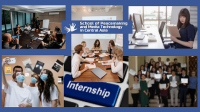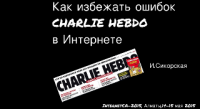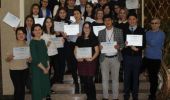 A group of
interns from Kyrgyzstan and Kazakhstan have trained in monitoring,
documentation, analysis tools and launched their research.
A group of
interns from Kyrgyzstan and Kazakhstan have trained in monitoring,
documentation, analysis tools and launched their research.
This year, topics such as "Freedom of expression during conflicts” and "The impact of wars and conflicts on the media sphere of Central Asia” are analyzed.
The research is carried out in three stages. At the first stage, young researchers collect information from the media, the Internet and conduct test surveys.
In the second stage, the information will be ranked, analyzed and reports drafted.
The third stage includes joint work with the School of Peacemaking’s mentors. They will check the reports and give reviews, then the internship participants will finalize their research. According to the annual internship schedule, young researchers must finalize their reports by January 25, 2024.
After completing the internship and defending their work, each participant will receive a certificate and a recommendation’s letter, which will help the interns to build their careers.
Over the past six years, 28 senior students from universities in Central Asia have improved their competencies in the field of research and monitoring of peace & conflict issues.
 The
School of Peacemaking and Media Technology in Central Asia announces an annual competition
among students from Kyrgyzstan, Kazakhstan, Uzbekistan, Tajikistan, studying journalism and
mass communication, law, cultural studies and anthropology, to participate in
research and media monitoring projects.
The
School of Peacemaking and Media Technology in Central Asia announces an annual competition
among students from Kyrgyzstan, Kazakhstan, Uzbekistan, Tajikistan, studying journalism and
mass communication, law, cultural studies and anthropology, to participate in
research and media monitoring projects.
Over the past six years, about 80 students have completed research internships.
This internship is scheduled for the period from December 15, 2023 to January 25,
2024.
In some cases, a student can start an internship earlier.
The internship will be carried out in a distance format or offline.
The selected interns will be trained in new analytical tools, will have access to databases
and, together with the team, will conduct a few studies.
Participation in the project is a good practice, upon completion of which an internship
confirmation letter will be issued. An important criterion for selecting interns is language proficiency, perseverance, attentiveness, a clear application of methodology and indicators in practice, a desire to work with large amounts of information.
Topics for research this year:
Freedom of expression in the conflict time
Media хenophobia and hate speech (focused on local countries context)
Media and conflict
Information wars and geopolitics
A motivation letter and a CV including the contacts of at least two referees should be sent to peacemakingandmediaca@gmail.com until 18:00 Bishkek time, December 6, 2023 marked "For internship".
Applications sent after this deadline will not be considered. The team does not comment on
the selection methods and does not respond to letters of inquiry after the end
of the call.
About the organization:The School of Peacemaking and Media Technology in Central Asia is a media
development, peace communications and freedom of expression organization focused on countering hate speech, discrimination in the media, on the Internet and public discourse.
Our vision statement aims at encouraging diversity, human rights, peace fair journalism access to information and citizens making informed opinions as a means of promoting a tolerant society.
Since 2011, the School of Peacemaking and Media Technology in Central Asia has implemented nearly 20 programs focused on these activities.
How to counter aggressive communications on the Internet and what is the difference between cyberbullying and other forms of online aggression? Judges of the Supreme Court of Kazakhstan in Astana were trained in new tools developed by the School of Peacekeeping and Media Technology.
Inga Sikorskayia, media trainer and head of the School of Peacemaking, conducted several practical sessions in which 30 judges and court workers took part offline in the Supreme Court and 250 participants from regional Kazakhstan courts online.
The participants were learned effective strategies and gained valuable knowledge and skills that will help them communicate effectively. While working in teams, those present used real cases and, based on tools, were trained to manage aggressive communication.
The training was organized by the judicial administration together with the Legal Media Center with the support of the OSCE Program Office in Astana.
 Reports and master
classes about it topics were presented at the Internet Forum by I. Sikorskaya
and V.Mamedov, expertsof the School
of Peacemaking and Media Technologies. Experts believe that new tools of
linguistic, speech, digital security and visual hygiene will help journalists,
rights activists and users improve their network communications in the digital
age.
Reports and master
classes about it topics were presented at the Internet Forum by I. Sikorskaya
and V.Mamedov, expertsof the School
of Peacemaking and Media Technologies. Experts believe that new tools of
linguistic, speech, digital security and visual hygiene will help journalists,
rights activists and users improve their network communications in the digital
age.
The study and master classes on linguistic, speech, digital security and visual hygiene were provided byat the 6thannual international forumDevelopment of Internet Sphere in Central Asia InternetCA-2015, which was held May 14-15 in Almaty (Kazakhstan).At the forum were also participated experts from Kazakhstan, Germany, Russia, Ukraine, Bulgaria and the OSCE.
The advanced course presented by Peacemakingschool’s experts goes beyond all existing methodologies since it offers the complex approach: from knowledge-based tools to technological skills and development of new network thinking in the digital age.

The School of Peacemaking and Media Technology in Central Asia announces an annual competition among students from Kyrgyzstan, Kazakhstan,…

25 journalists and media workers from various regions of Kyrgyzstan have been trained to counter the propaganda of violent extremism and hate in…